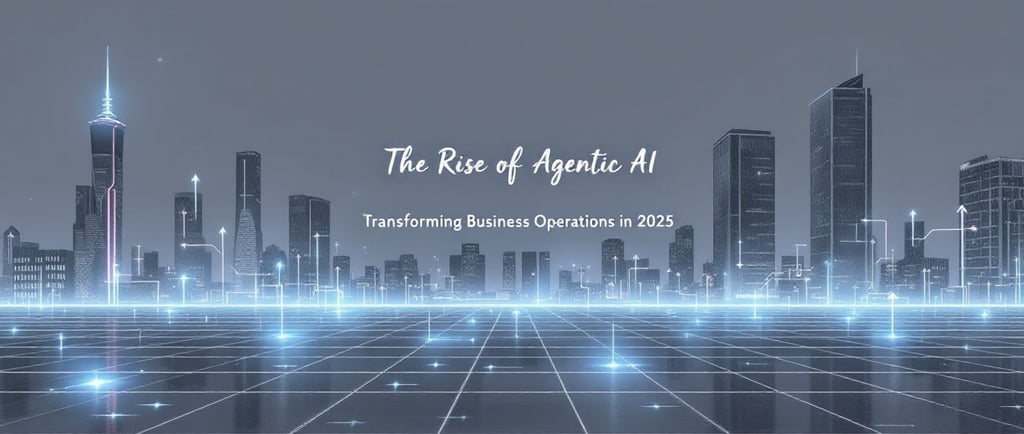The Rise of Agentic AI: Transforming Business Operations in 2025
How Intelligent Autonomous Agents Are Reshaping Industries
Arpit Singh
1/26/20252 min read


How Intelligent Autonomous Agents Are Reshaping Industries
Artificial Intelligence has rapidly evolved from rule-based automation to self-learning, decision-making systems that can operate independently. Agentic AI represents the next frontier—an advanced AI paradigm where intelligent agents autonomously analyze data, execute decisions, and optimize business processes without human intervention.
Unlike traditional AI models, which function based on predefined workflows, Agentic AI adapts in real-time, learns from changing environments, and executes actions based on dynamic inputs. This breakthrough is redefining efficiency, cost savings, and business agility, making it one of the most impactful technological shifts in 2025.
What Makes Agentic AI Different?
✅ Autonomous Decision-Making
Traditional AI tools assist decision-making by providing insights, but they still require human intervention to act. Agentic AI removes the need for human input by autonomously making strategic decisions based on real-time data, predefined business objectives, and environmental changes.
For example, in finance, an AI agent can detect market fluctuations, predict risks, and execute stock trades without human oversight—a level of automation that was once thought impossible.
✅ Continuous Learning & Adaptation
Unlike rule-based automation, which follows static commands, Agentic AI continuously improves its models, learning from every action taken. This adaptability allows businesses to handle complex, evolving challenges such as customer sentiment changes, supply chain disruptions, or market demand fluctuations.
For instance, Amazon’s AI-powered supply chain leverages real-time data to optimize inventory, predict demand, and automate restocking, reducing inefficiencies across its global network.
✅ Proactive Business Operations
One of the defining characteristics of Agentic AI is its proactive nature. Instead of reacting to input, these AI agents anticipate market trends, identify inefficiencies, and take preventive measures to optimize performance.
For example, in customer support, AI agents monitor user sentiment, previous interactions, and service history to resolve issues before they escalate, drastically improving customer satisfaction.
Industries Benefiting from Agentic AI
📦 Supply Chain & Logistics
Logistics companies have started deploying Agentic AI to automate route planning, inventory forecasting, and demand prediction. DHL, for example, utilizes AI-driven robotics and intelligent systems to increase warehouse efficiency and reduce delivery delays.
🔹 AI Benefit: Autonomous supply chain adjustments, reducing stock shortages and minimizing overstocking.
🏦 Finance & Banking
The finance industry is witnessing a revolution in fraud detection, risk assessment, and personalized financial services using AI agents. A report from McKinsey highlights that AI-driven fraud detection systems have reduced financial fraud by up to 80%.
🔹 AI Benefit: Real-time fraud detection and prevention, enhanced credit risk assessment, and AI-powered robo-advisory services.
🎯 Marketing & Sales
Agentic AI is transforming how businesses engage customers by automating lead qualification, campaign optimization, and personalized recommendations. AI-driven assistants analyze customer behavior to predict purchasing intent and tailor marketing campaigns in real time.
🔹 AI Benefit: Higher conversion rates, enhanced customer engagement, and data-driven sales strategies.
The Future of Agentic AI: What Lies Ahead?
With advancements in AI regulation, ethical AI development, and computational power, Agentic AI is expected to become more refined and widely adopted across industries. According to Gartner, more than 70% of enterprises will incorporate AI-driven autonomous systems into their workflows by 2026.
However, there are challenges that businesses need to navigate:
Regulatory compliance: As AI agents become more autonomous, businesses must adhere to data privacy and ethical AI regulations.
Workforce adaptation: Companies must train employees to work alongside AI agents, ensuring a smooth transition to AI-augmented roles.
Security concerns: Increased AI autonomy requires strong cybersecurity measures to prevent unauthorized AI decision-making.
Final Thoughts: Why Businesses Must Act Now
Companies that leverage Agentic AI will enjoy a significant competitive advantage in terms of cost reduction, operational efficiency, and customer satisfaction. The ability of AI agents to make real-time decisions, adapt to changing business needs, and automate complex processes will define the next decade of innovation.
🔗 Further Reading: The Future of AI in Business
Get in touch
Address
RG Trade Tower
Netaji Subhash Place, Pitampura, Delhi, 110034
Contacts
+91 97110 93598
info@quantackle.com
